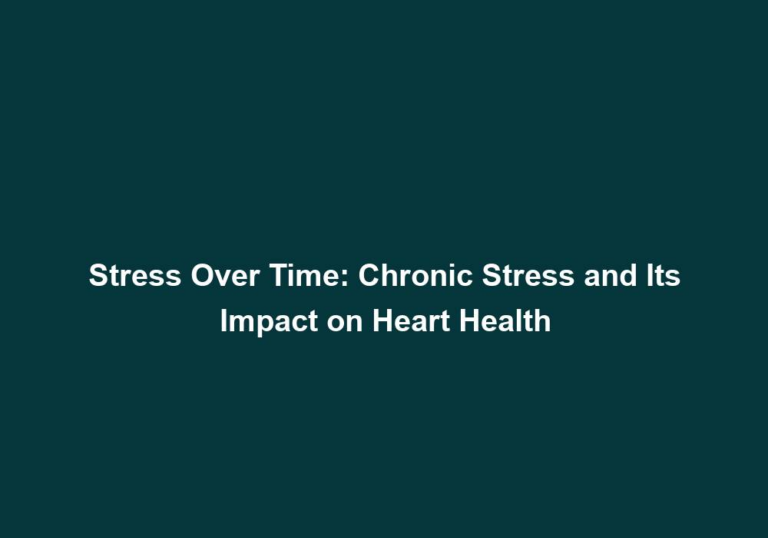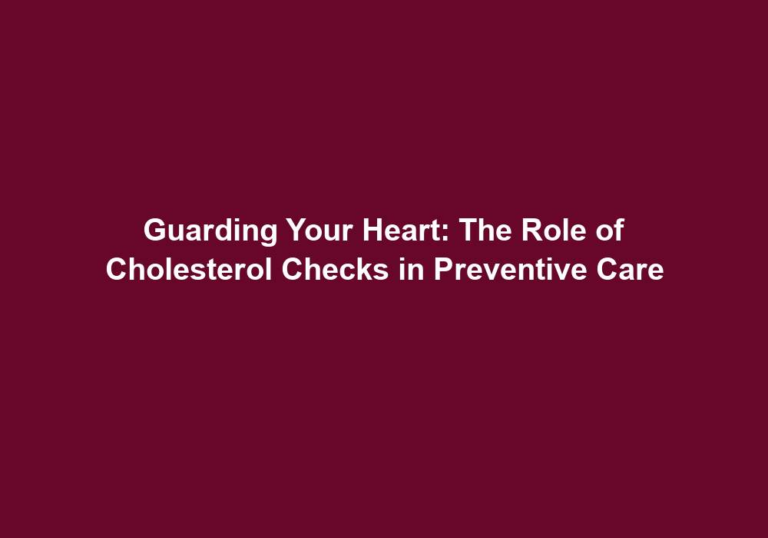Mind Matters: Exploring Psychology in Heart Health
Heart health is a critical aspect of overall well-being, and while physical factors such as diet and exercise play a significant role, the impact of psychological factors on heart health should not be underestimated. In this article, we will delve into the fascinating connection between psychology and heart health, exploring various concepts and strategies that can contribute to a healthier heart and a happier mind.
The Mind-Heart Connection
It is well-known that stress, anxiety, and other negative emotions can have a detrimental effect on our overall health, including our cardiovascular system. The mind-heart connection is a complex interplay between our thoughts, emotions, and physiological responses. Understanding and managing this connection is crucial for maintaining optimal heart health.
When we experience stress, our bodies release stress hormones like cortisol and adrenaline. These hormones can lead to an increase in blood pressure, heart rate, and inflammation, which, over time, can contribute to the development of cardiovascular diseases such as hypertension and heart disease. Additionally, chronic stress can disrupt healthy behaviors like sleep, exercise, and eating habits, further impacting heart health.
To manage the mind-heart connection, it is important to develop effective stress management techniques. By incorporating relaxation techniques, such as deep breathing, meditation, and progressive muscle relaxation, individuals can reduce stress levels and promote a sense of calmness. Engaging in regular physical activity is also crucial, as exercise not only benefits our physical well-being but also releases endorphins, which are natural stress relievers.
Cognitive Behavioral Therapy for Heart Health
Cognitive Behavioral Therapy (CBT) has emerged as a powerful tool in managing stress and improving heart health. CBT focuses on identifying and changing negative thought patterns and behaviors that contribute to stress and anxiety. By working with a trained therapist, individuals can learn healthier coping mechanisms and develop a more positive mindset, ultimately reducing their stress levels and promoting heart health.
In CBT, individuals are taught to challenge and reframe negative thoughts and beliefs. This process helps them develop a more realistic and positive outlook on life, which can have a significant impact on their heart health. Additionally, CBT equips individuals with effective problem-solving skills, enhancing their ability to manage stressors and reduce the negative impact of stress on their cardiovascular system.
The Power of Positive Emotions
Positive emotions, such as happiness, gratitude, and optimism, have been shown to have a significant impact on heart health. Research has revealed that individuals with a positive outlook on life tend to have lower blood pressure, reduced inflammation, and a decreased risk of heart disease. Incorporating practices such as mindfulness, gratitude journaling, and engaging in activities that bring joy can foster a more positive mental state and contribute to a healthier heart.
Mindfulness, in particular, has gained recognition for its positive effects on both mental well-being and heart health. By practicing mindfulness, individuals can cultivate a greater awareness of their thoughts and emotions, allowing them to respond to stressors in a more adaptive manner. Mindfulness techniques, such as meditation and deep breathing exercises, can also help regulate heart rate and blood pressure, promoting cardiovascular health.
Social Support and Heart Health
Human beings are social creatures, and maintaining strong social connections is vital for our overall well-being, including our heart health. Research indicates that individuals with robust social support systems have a lower risk of heart disease and are more likely to recover successfully from cardiac events. Nurturing healthy relationships, participating in community activities, and seeking support from loved ones can provide a protective effect on our hearts.
Having a support system helps individuals cope with stress more effectively and provides emotional and practical assistance during challenging times. Social support can also encourage healthy behaviors, such as exercising together or sharing nutritious meals. By fostering meaningful connections and surrounding themselves with positive influences, individuals can promote both their mental and heart health.
The Role of Personality Traits
Our personality traits can also influence our heart health. For instance, individuals who exhibit hostility, aggression, or a pessimistic outlook on life are more prone to develop heart diseases. On the other hand, individuals with traits such as conscientiousness, optimism, and emotional stability tend to have better heart health outcomes. Recognizing the impact of personality traits on heart health can motivate individuals to adopt positive behaviors and cultivate healthier mindsets.
By understanding their own personality traits, individuals can identify areas for improvement and develop strategies to promote heart health. For example, someone with a pessimistic outlook can work on reframing negative thoughts and focusing on positive aspects of their life. Additionally, cultivating traits like conscientiousness can lead to healthier lifestyle choices, such as maintaining a balanced diet, exercising regularly, and adhering to medication regimens if necessary.
Effective Stress Management Techniques
Managing stress effectively is crucial for maintaining a healthy heart. Here are some proven stress management techniques that can promote heart health:
-
Exercise: Engaging in regular physical activity not only benefits our physical well-being but also releases endorphins, which are natural stress relievers. Aim for at least 30 minutes of moderate-intensity exercise most days of the week. Consider activities such as brisk walking, cycling, swimming, or dancing.
-
Relaxation Techniques: Practices such as deep breathing, meditation, and progressive muscle relaxation can help reduce stress and promote a sense of calmness. Set aside dedicated time each day to practice these techniques, even if it’s just for a few minutes.
-
Healthy Lifestyle: Adopting a healthy lifestyle that includes a balanced diet, adequate sleep, and limiting alcohol and tobacco consumption can significantly contribute to stress reduction and overall heart health. Focus on incorporating whole foods, such as fruits, vegetables, whole grains, lean proteins, and healthy fats, into your diet.
-
Time Management: Learning effective time management techniques, setting priorities, and avoiding overcommitment can help reduce stress levels and improve overall well-being. Prioritize tasks, delegate when possible, and practice saying ‘no’ to non-essential commitments to create a more manageable schedule.
Seeking Professional Help
While incorporating stress management techniques into our lives is valuable, it is essential to recognize when professional help is needed. If stress and negative emotions are significantly impacting your daily life and heart health, seeking the guidance of a mental health professional, such as a psychologist or therapist, can provide valuable support and help develop personalized strategies for managing stress effectively.
A mental health professional can work with you to identify the root causes of your stress, provide tools for managing stress, and offer a safe space for discussing and processing your emotions. They can also help address any underlying psychological factors that may be contributing to heart health issues, such as anxiety or depression.
In conclusion, the connection between psychology and heart health is undeniable. By understanding and managing the mind-heart connection, practicing stress management techniques, fostering positive emotions, and seeking social support, individuals can promote a healthier heart and a happier mind. Remember, a holistic approach to health addresses both physical and psychological factors, ultimately leading to a more fulfilling and heart-healthy life.







